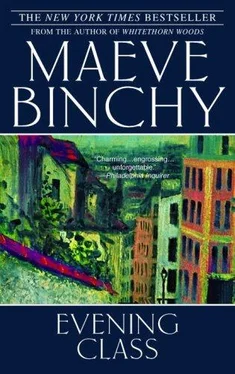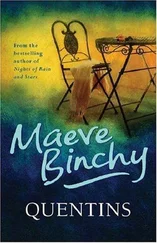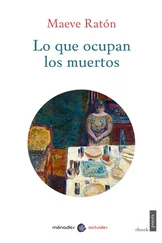Maeve Binchy - Evening Class
Здесь есть возможность читать онлайн «Maeve Binchy - Evening Class» весь текст электронной книги совершенно бесплатно (целиком полную версию без сокращений). В некоторых случаях можно слушать аудио, скачать через торрент в формате fb2 и присутствует краткое содержание. Жанр: Современная проза, на английском языке. Описание произведения, (предисловие) а так же отзывы посетителей доступны на портале библиотеки ЛибКат.
- Название:Evening Class
- Автор:
- Жанр:
- Год:неизвестен
- ISBN:нет данных
- Рейтинг книги:3 / 5. Голосов: 1
-
Избранное:Добавить в избранное
- Отзывы:
-
Ваша оценка:
- 60
- 1
- 2
- 3
- 4
- 5
Evening Class: краткое содержание, описание и аннотация
Предлагаем к чтению аннотацию, описание, краткое содержание или предисловие (зависит от того, что написал сам автор книги «Evening Class»). Если вы не нашли необходимую информацию о книге — напишите в комментариях, мы постараемся отыскать её.
Evening Class — читать онлайн бесплатно полную книгу (весь текст) целиком
Ниже представлен текст книги, разбитый по страницам. Система сохранения места последней прочитанной страницы, позволяет с удобством читать онлайн бесплатно книгу «Evening Class», без необходимости каждый раз заново искать на чём Вы остановились. Поставьте закладку, и сможете в любой момент перейти на страницу, на которой закончили чтение.
Интервал:
Закладка:
When she had finished she felt much stronger.
Tt's all right, I won't cry again,' she said, when the lunchtime crowd had left and Brenda slid in opposite her.
'You're not to go back to your mother, Nora. I don't want to come between families, but really and truly she was never a mother to you when you needed it, why should you be a daughter to her now when she needs it?'
'No, no I don't feel any sense of duty about it at all.'
'Thank God for that,' Brenda said, relieved.
'But I will need to work, to earn a living, to pay my way. Do you need anyone here to peel potatoes, clean up or anything?'
Gently Brenda told her friend that it wouldn't work out, and they had youngsters, trainees. They had been themselves trainees all those years ago. Before… well, before everything changed.
'Anyway, Nora, you're too old to do that, you're too well trained. You can do all kinds of things, work in an office, teach Italian maybe.'
'No, I'm too old, that's the problem. I never used a typewriter, let alone a computer. I don't have any qualifications to teach.'
'You'd better sign on to get some money, anyway.' Brenda was always practical.
'Sign on?'
'For the dole, for unemployment benefit.'
'I can't do that, I'm not entitled.'
'Yes, you are. You're Irish, aren't you?'
'But I lived away for so long, I contributed nothing to the country.' She was adamant.
Brenda looked worried. 'You can't start being like Mother Teresa here, you know. This is the real world, you have to look to yourself and take what's being offered.'
'Brenda, don't worry about me, I'm a survivor. Look what I survived for nearly a quarter of a century. Most people would not have done that. I found a place to live within hours of coming back to Dublin. I'll find a job too.'
Signora was brought into the kitchen to meet Pillow Case, whom she managed to call Patrick with difficulty. He was courteous and grave as he welcomed her back and sympathised formally on the death of her husband. Did he think Mario really had been her husband or was it just for appearances in front of these young people who watched him with reverence?
Signora thanked them for the delicious meal and said she would return to eat there again under her own steam.
'We are going to have an Italian season of cooking soon. Perhaps you would translate the menus for us?' Patrick suggested.
'Oh I'd be delighted.' Signora's face lit up. This would go some way towards paying for a meal that would have cost more than she could hope to earn in two weeks.
'It would be all done officially, for a fee and everything,' Patrick insisted. How had the Brennans become so smooth and sophisticated? Offering her money without being seen to give her a handout.
Signora's will strengthened even further. 'Well, we'll discuss that when the time comes. I won't delay you, and I'll be in touch next week to tell you my progress.' She left swiftly without protracted goodbyes. That was something she had learned over the years in her village. People liked you more if you didn't stay on interminably, if they realised that a conversation was going to have an end.
She bought teabags and biscuits, and as a luxury a cake of nice soap.
She asked several restaurants for kitchen work and was politely refused everywhere. She tried a supermarket for shelf stacking and newsagents for a job as an assistant or someone to open the piles of papers and magazines for them. She felt that they looked at her puzzled. Sometimes they asked her why she wasn't going through the Job Centre and she looked at them with vague eyes which confirm their view that she might be a bit simple.
But she did not give in. Until five o'clock she sought work. Then she took a bus to where her mother lived. The flats were in their own grounds, raised flower beds with little bushes and ground cover provided the landscaping, as it was called. A lot of the doors had ramps as well as steps. This was a development, purpose built for the needs of the elderly. With mature trees and bushes around it and built in red brick it looked solid and safe, something that would appeal to those who had sold their family homes to end their days here.
Signora sat quietly hidden by a large tree. She held her paper bag of possessions on her lap and watched the doorway of number 23 for what must have been a long time. She was so used to being still she never noticed time pass. She never wore a watch so time and its passing were not important to her. She would watch until she saw her mother, if not today then another day, and once she saw her then she would know what to do. She could make no decision until she had seen her mother's face. Perhaps pity would be uppermost in her heart, or love from the old days, or forgiveness. Perhaps she might see her mother only as another stranger and one who had spurned love and friendship in the past.
Signora trusted feelings. She knew she would know.
Nobody went in or out of number 23 that evening. At ten o'clock Signora gave up her post and took a bus back to the Sullivans'. She let herself in quietly and went upstairs, calling goodnight into the room where the television blared. The boy Jerry sat with them watching. No wonder the child didn't pay much attention at school if he was up till all hours watching Westerns.
They had found her an electric ring and an old kettle. She made herself tea and looked out at the mountains.
Already in thirty-six hours there was a . little veil in her mind over the memory of Annunziata and the walk out to Vista del Monte. She wondered would Gabriella ever be sorry that she had sent Signora away. Would Paolo and Gianna miss her? Would Signora Leone wonder how her friend the Irishwoman was faring far across the sea? Then she washed with the nice soap that smelled of sandalwood, and slept. She didn't hear the sound of the gunfights in the saloons or the flight of the covered wagons. She slept long and deeply.
When she got up the house was empty. Peggy gone to her supermarket, Jimmy out on a driving job and Jerry putting in the day at his school. She set out on her journey. This time she would target her mother's home for a morning stake-out. She would look for jobs later on. Again she sat behind her familiar tree, and this time she didn't have long to wait. A small car drew up outside number 23 and a matronly woman, thickset, with very tightly permed red hair, got out. With a gasp she realised this was her younger sister Rita. She looked so settled in her ways, so middle-aged even though she must only be forty-six. She had been a girl when Signora left, and of course there had been no photograph, any more than there had been warm family letters in the meantime. She must remember that. They only wrote when they needed her, when the comfort of their own lives seemed bigger than the effort of getting in touch with the madwoman who had disgraced herself by fleeing to Sicily to follow a married man.
Rita looked stiff and tense.
She reminded Signora of Gabriella's mother, a small angry woman whose eyes darted around her seeing faults everywhere but not being able to define them. She was meant to suffer with her nerves, they said. Could this really be Rita her little sister, this woman with shoulders hunched, with feet squashed into shoes that were too tight, taking a dozen short fussy steps when four would have done? Signora watched aghast from behind her tree. The door of the car was open, she must be going in to collect Mother. She braced herself for the shock. If Rita looked old, what must mother be like now?
She thought of the old people in Annunziata. Small, bent often over sticks, sitting out in the square watching people go by, always smiling, often touching her skirt and looking at the embroidery ' Bella bellissima' , they would say.
Her mother would not be like that. Her mother was a well preserved seventy-seven. She wore a brown dress and brown cardigan over it. Her hair was pulled back as it had always been into that unfashionable bun Mario had commented on all those years ago. 'Your mother would be handsome if she let her hair be more free.'
Читать дальшеИнтервал:
Закладка:
Похожие книги на «Evening Class»
Представляем Вашему вниманию похожие книги на «Evening Class» списком для выбора. Мы отобрали схожую по названию и смыслу литературу в надежде предоставить читателям больше вариантов отыскать новые, интересные, ещё непрочитанные произведения.
Обсуждение, отзывы о книге «Evening Class» и просто собственные мнения читателей. Оставьте ваши комментарии, напишите, что Вы думаете о произведении, его смысле или главных героях. Укажите что конкретно понравилось, а что нет, и почему Вы так считаете.












